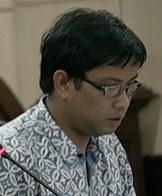The Jakarta Post, Activists are calling on president-elect Joko “Jokowi” Widodo to throw his weight behind the enactment of an asset-forfeiture bill that was in the pipeline during the administration of President Susilo Bambang Yudhoyono.
The bill — which many believe would provide effective guidelines to deter people from corruption and money laundering — was among the House of Representatives’ legislation priorities to be deliberated in 2011, but was taken off the list in 2012 and 2013.
Some asset-recovery measures have already been addressed in the 12-year-old Corruption Law and the 2010 Money Laundering Law, but those are considered inadequate and are rarely implemented effectively.
The activists’ call was made amid a judicial review on the Money Laundering Law at the Constitutional Court petitioned by former court chief justice and corruption convict Akil Mochtar, who is seeking to scrap articles that may give authority to the Corruption Eradication Commission (KPK) to confiscate assets in money laundering cases.
The KPK seized Akil’s cars and property during an investigation into corruption surrounding him. After the Jakarta Corruption Court found Akil guilty of receiving bribes in return for the favor of a win in a local election dispute, the court ruled that the KPK must return his assets.
The KPK, however, is appealing to higher courts to make Akil’s asset seizure final.
“Asset recovery should be one of the main focuses of the Jokowi administration since recovered assets can also contribute quite a lot to the state treasury,” said Institute for Criminal Justice Reform (ICJR) executive director Supriyadi Widodo Eddyono on Saturday.
The ICJR also urged Jokowi to improve asset management and monitoring, as well as the bill, which they deemed as “being put to sleep for almost four years due to a lack of political support”.
According to Supriyadi, the existing guidelines for asset seizure and confiscation can only be implemented after the court finds a culprit guilty.
Emerson Yuntho from the Indonesia Corruption Watch (ICW) also believed that enacting an asset-recovery law could be an effective way to deter corruption and therefore should be made a priority by the incoming government and lawmakers.
“If the next administration is really committed to an anti-graft campaign, Jokowi should make the bill one of his priorities as it cannot be separated from broader anti-graft measures,” Emerson said.
He also criticized the outgoing Yudhoyono and lawmakers for being afraid to enact the law.
Indonesia ratified the UN Convention Against Corruption (UNCAC) in 2006, but has failed to adopt some critical provisions — including the recovery of stolen assets from overseas, the authority to probe foreign bribery cases and illicit enrichment — as law.
Yudhoyono claimed during the fourth Indonesian Corruption Forum in June that he had implemented many measures to combat corruption, although he later also admitted that he had failed to eradicate corruption and expected his successor to continue in his stead.
Examples of the failure to recover stolen assets in graft and money-laundering cases include those involving former member of the House’s budgetary committee Wa Ode Nurhayati and former Democratic Party lawmaker Angelina Sondakh, both of whom have been convicted in corruption cases.
The latest development in efforts to support asset forfeiture was made by the Supreme Court early last year by issuing Supreme Court Regulation No. 1/2013, which stipulates procedures for the settlement of asset forfeiture in money laundering and other crimes. These procedures serve as guidelines for judges in confiscating assets from graft defendants, based on the so-called non-conviction based asset-forfeiture principle.
The Supreme Court has also ordered judges nationwide to apply a new mechanism that would force defendants to return assets obtained from graft, drug offences, terrorism and other crimes to state coffers, without having to wait for a verdict to be handed down.


![[PUBLIKASI KOALISI] Sembilan Masalah dalam RUU KUHAP](https://icjr.or.id/wp-content/uploads/elementor/thumbs/KUHAP-Tidak-Kenal-Putusan-Bebas-Tidak-Murni-r4it87xch1kykol8d42dervmqfa73epsm0p5zb3hnw.jpg)

